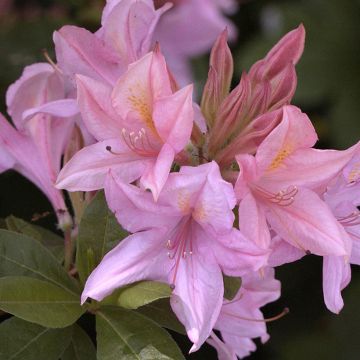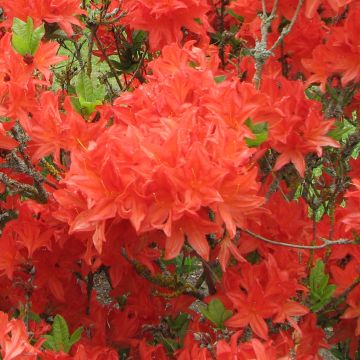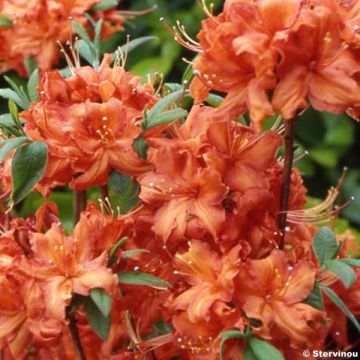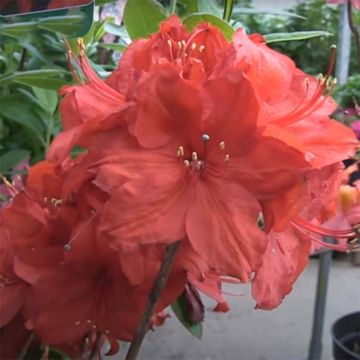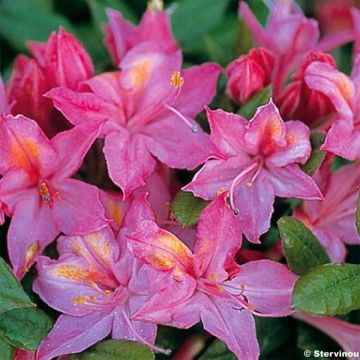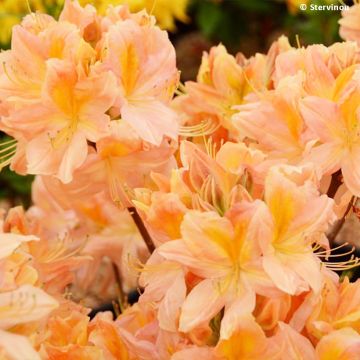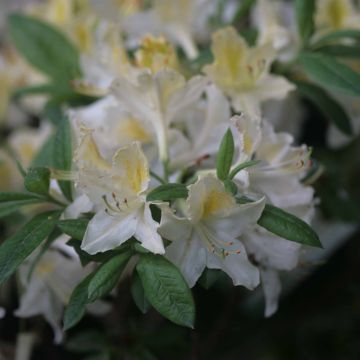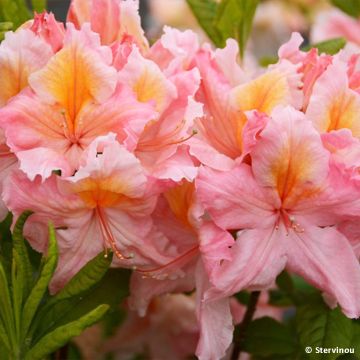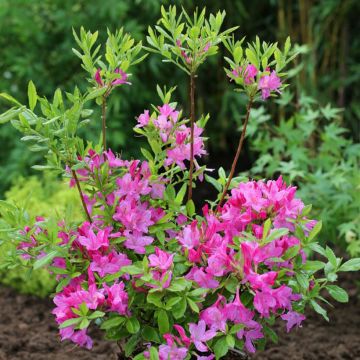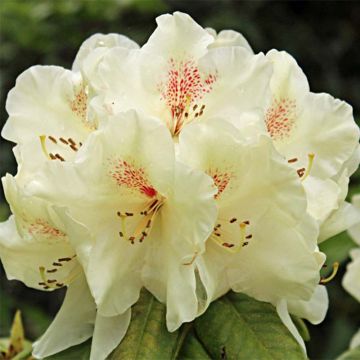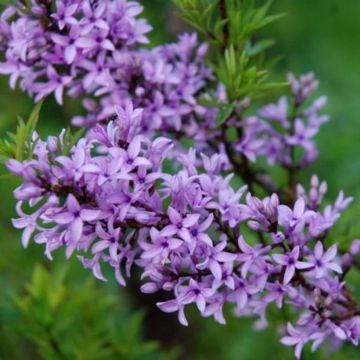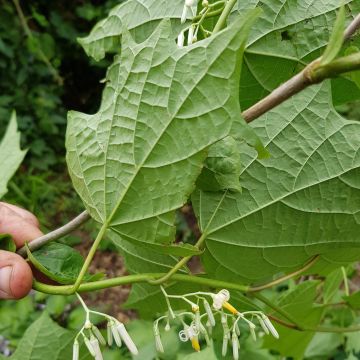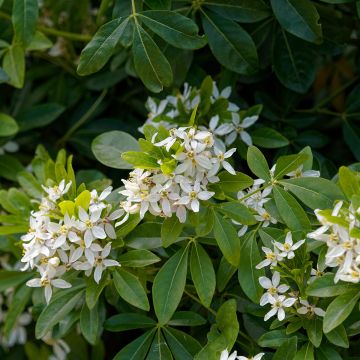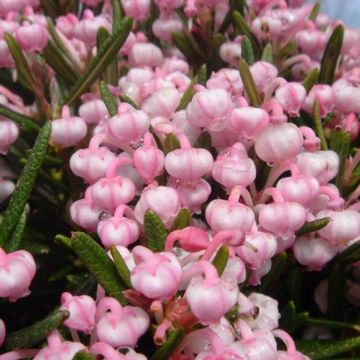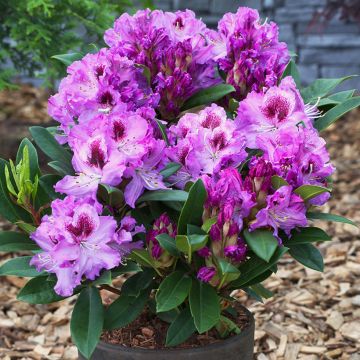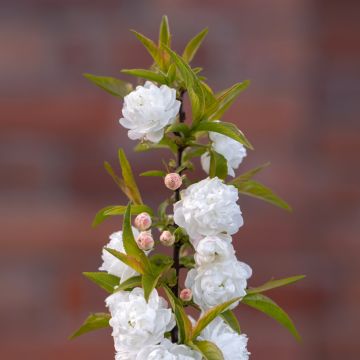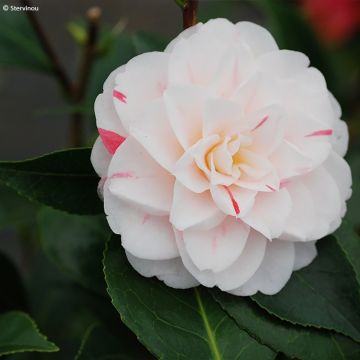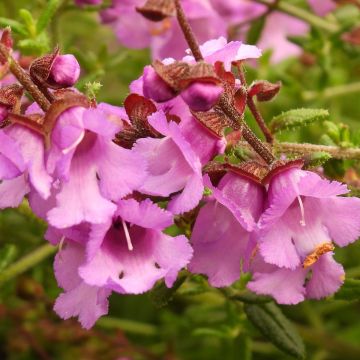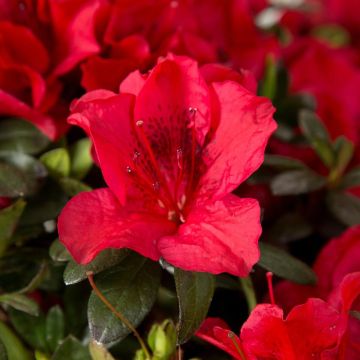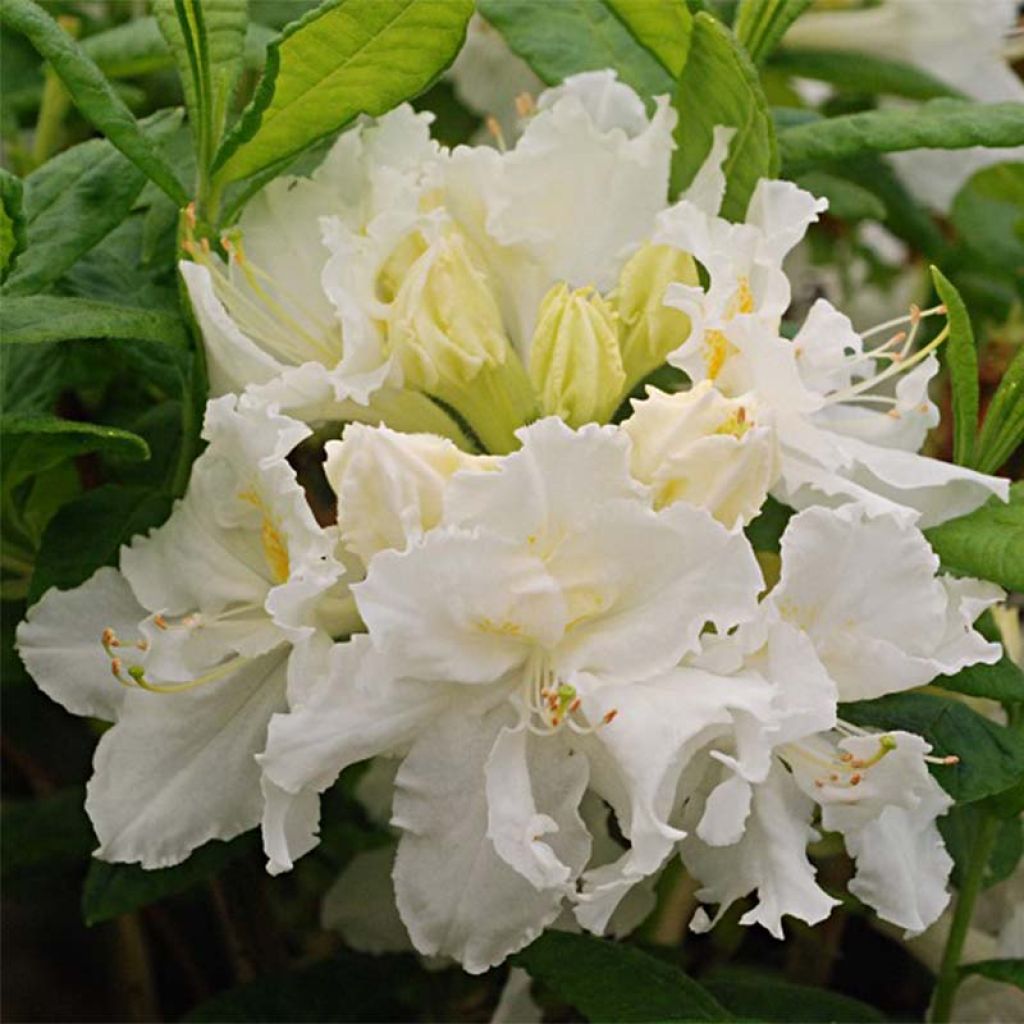

Azalée de Chine White Frills - Azalea mollis
Azalea mollis White Frills
Rhododendron (Azalea) x mollis White Frills
Chinese Azalea, Soft Rhododendron
Order received quickly. We have to wait until next year to find out if it will bloom again or not and see the first flowers.
monique, 08/10/2020
This plant carries a 24 months recovery warranty
More information
We guarantee the quality of our plants for a full growing cycle, and will replace at our expense any plant that fails to recover under normal climatic and planting conditions.
From €5.90 for pickup delivery and €6.90 for home delivery
Express home delivery from €8.90.
Does this plant fit my garden?
Set up your Plantfit profile →
Description
Azalea 'White Frills' is a pretty variety of Chinese Azalea that is very rare in cultivation. Beautiful in stature, it is distinct because of its generous, fairly early spring blooms, consisting of clusters of very ruffled, semi-double, white flowers, enhanced by a small, slightly greenish-yellow flare. This variety also produces attractive autumn foliage in shades of coppery orange. Unlike Japanese Azaleas, this semi-evergreen plant is very hardy. Too little known and too little used, deciduous Azaleas are very graceful plants growing in chalk-free soil, with a whole host of qualities so do not hesitate to plant it in the garden or in a large pot on the terrace!
The origins of the 'White Frills' Azalea remain a bit of a mystery, and there is little information in the literature regarding its classification within the various groups of hybrid Azaleas. This shrub, like the Rhododendron molle which is the parent of most deciduous Azaleas grown in gardens, is a member of the heather or Ericaceae family, native to central and eastern China. Some sources indicate that 'White Frills' was developed before 1987 by Amann in Maryland, USA.
'White Frills' is a rather slow-growing shrub. It has a slightly loose habit in its early years, then its branches fill out and spread over time, giving the plant a gracefully spreading and bushy appearance. At maturity, this Azalea will reach about 1.30m (4 ft 4 in) in height and 1.20m (3 ft 11 in) in spread. It flowers over a long period from April-May, depending on the climate, at the same time as the young leaves appear on the branches. The flowers, which appear almost double, are 4cm (1.6 in) wide, have a very ruffled lily-like shape and are gathered in generous terminal clusters. They emerge from pale yellow buds and are adorned with 5 long, arched yellow stamens that contribute to the beauty of the flowers. The upper petal is adorned with a discreet yellow-green spot. The foliage, deciduous to evergreen, depending on the climate, is composed of simple, oval-lanceolate leaves with smooth edges, arranged alternately on the branches. They vary from 5 to 10 cm (2 to 3.9 inches) in length, and their dark green summer colour turns to coppery-orange in October. Azaleas and Rhododendrons have a shallow root system that always needs to be kept moist, but they also dislike waterlogged soil which would suffocate the roots.
Deciduous Chinese Azaleas have fewer requirements than evergreen, Japanese Azaleas: they are very hardy and tolerate sunny positions, and even dry soil on occasion, depending on the hybrids. However, they give their best in cool climates, with distinct winters, planted in humus-rich, fertile, lime-free soil. They are beautiful shrubs for borders, with an attractive, informal habit, blooming twice a year. They are the perfect accompaniment to Japanese maples, which also change colour with the seasons, as well as Japanese camellias, or their graceful, often fragrant, autumn-flowering cousins, the Camellia sasanqua hybrids. They can also be grown in a large, carefully chosen pot, in suitable soil, and watered with lime-free water. The undeniable beauty of deciduous Azaleas merits the changes needed to create the conditions they prefer.
Report an error about the product description
Azalea mollis White Frills in pictures
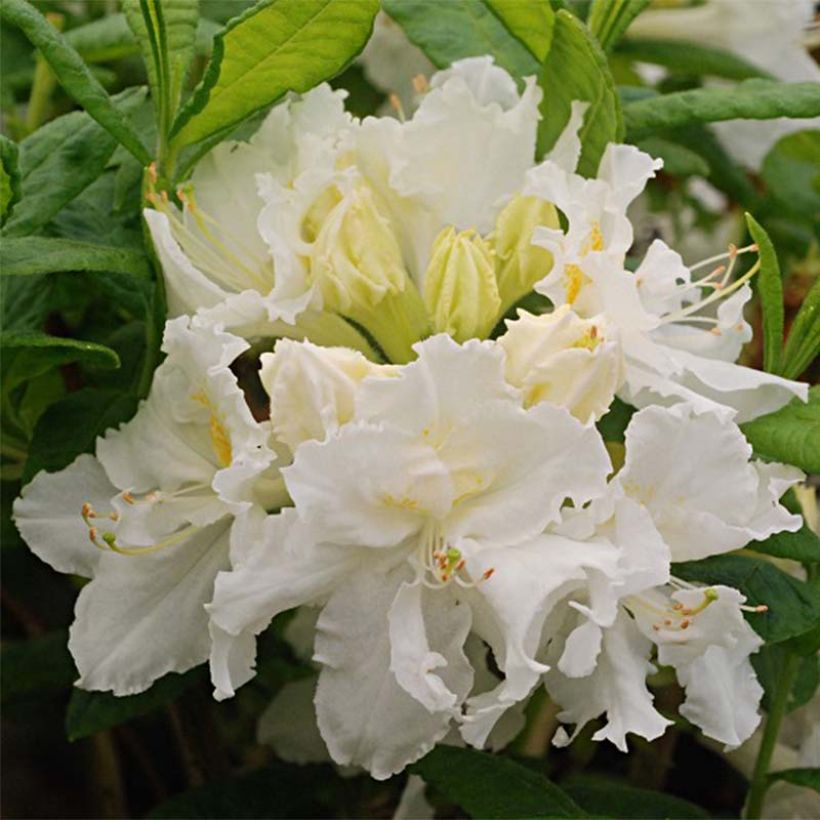

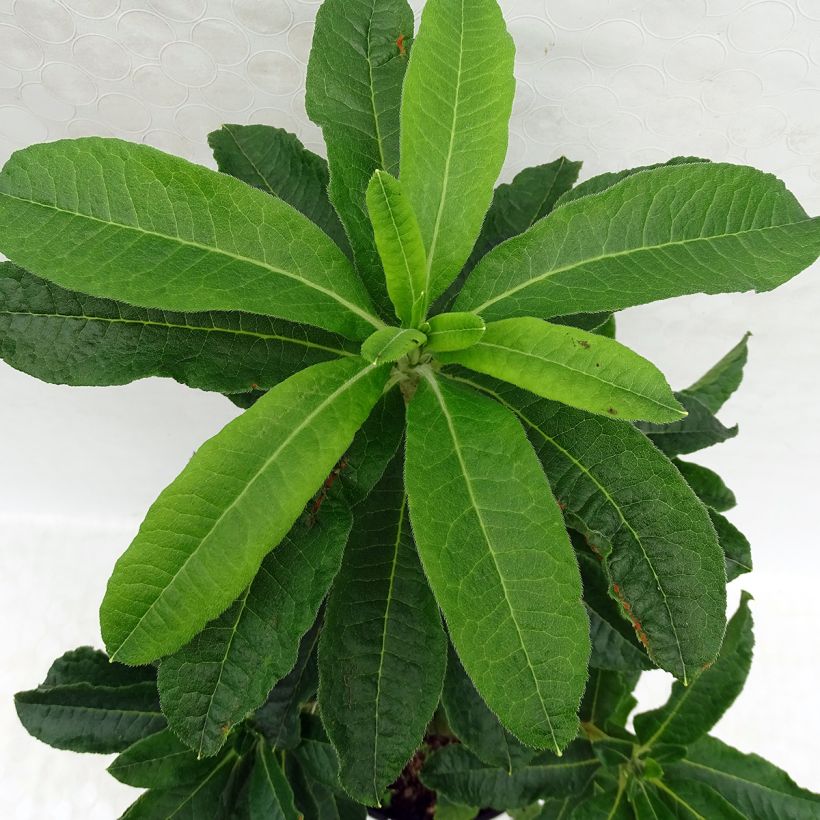

Plant habit
Flowering
Foliage
Botanical data
Rhododendron (Azalea)
x mollis
White Frills
Ericaceae
Chinese Azalea, Soft Rhododendron
Cultivar or hybrid
Other Chinese Azalea
Planting and care
Azalea mollis thrives in a sunny location, unlike the Japanese Azalea, but its favourite position is in partial shade or east-facing for the morning sun, especially in very hot and sunny regions. Plant it in ericaceous or humus-rich, well-drained and lime-free soil. Make sure not to plant the root ball too deep, it should be level with the surface of the soil. Water copiously with alkaline-free water during dry periods, at least once a week in the first year. In spring, apply a fertilizer for ericaceous plants. Pruning is not essential but it is a good idea to prune lightly after flowering to keep the plant looking neat. Remove spent flowers to encourage new growth. The Azalea suffers from very few diseases when well-established outdoors. It can be attacked by weevils that eat the edges of the leaves and rootlets, and by the famous "Rhododendron lace bug", though not often causing significant damage. If the soil is chalky or poorly drained, or if the root ball is too deep, the leaves may turn yellow and eventually die.
Some cultivars are quite susceptible to powdery mildew.
Planting period
Intended location
Care
-
, onOrder confirmed
Reply from on Promesse de fleurs
Spring-flowering shrubs
Haven't found what you were looking for?
Hardiness is the lowest winter temperature a plant can endure without suffering serious damage or even dying. However, hardiness is affected by location (a sheltered area, such as a patio), protection (winter cover) and soil type (hardiness is improved by well-drained soil).

Photo Sharing Terms & Conditions
In order to encourage gardeners to interact and share their experiences, Promesse de fleurs offers various media enabling content to be uploaded onto its Site - in particular via the ‘Photo sharing’ module.
The User agrees to refrain from:
- Posting any content that is illegal, prejudicial, insulting, racist, inciteful to hatred, revisionist, contrary to public decency, that infringes on privacy or on the privacy rights of third parties, in particular the publicity rights of persons and goods, intellectual property rights, or the right to privacy.
- Submitting content on behalf of a third party;
- Impersonate the identity of a third party and/or publish any personal information about a third party;
In general, the User undertakes to refrain from any unethical behaviour.
All Content (in particular text, comments, files, images, photos, videos, creative works, etc.), which may be subject to property or intellectual property rights, image or other private rights, shall remain the property of the User, subject to the limited rights granted by the terms of the licence granted by Promesse de fleurs as stated below. Users are at liberty to publish or not to publish such Content on the Site, notably via the ‘Photo Sharing’ facility, and accept that this Content shall be made public and freely accessible, notably on the Internet.
Users further acknowledge, undertake to have ,and guarantee that they hold all necessary rights and permissions to publish such material on the Site, in particular with regard to the legislation in force pertaining to any privacy, property, intellectual property, image, or contractual rights, or rights of any other nature. By publishing such Content on the Site, Users acknowledge accepting full liability as publishers of the Content within the meaning of the law, and grant Promesse de fleurs, free of charge, an inclusive, worldwide licence for the said Content for the entire duration of its publication, including all reproduction, representation, up/downloading, displaying, performing, transmission, and storage rights.
Users also grant permission for their name to be linked to the Content and accept that this link may not always be made available.
By engaging in posting material, Users consent to their Content becoming automatically accessible on the Internet, in particular on other sites and/or blogs and/or web pages of the Promesse de fleurs site, including in particular social pages and the Promesse de fleurs catalogue.
Users may secure the removal of entrusted content free of charge by issuing a simple request via our contact form.
The flowering period indicated on our website applies to countries and regions located in USDA zone 8 (France, the United Kingdom, Ireland, the Netherlands, etc.)
It will vary according to where you live:
- In zones 9 to 10 (Italy, Spain, Greece, etc.), flowering will occur about 2 to 4 weeks earlier.
- In zones 6 to 7 (Germany, Poland, Slovenia, and lower mountainous regions), flowering will be delayed by 2 to 3 weeks.
- In zone 5 (Central Europe, Scandinavia), blooming will be delayed by 3 to 5 weeks.
In temperate climates, pruning of spring-flowering shrubs (forsythia, spireas, etc.) should be done just after flowering.
Pruning of summer-flowering shrubs (Indian Lilac, Perovskia, etc.) can be done in winter or spring.
In cold regions as well as with frost-sensitive plants, avoid pruning too early when severe frosts may still occur.
The planting period indicated on our website applies to countries and regions located in USDA zone 8 (France, United Kingdom, Ireland, Netherlands).
It will vary according to where you live:
- In Mediterranean zones (Marseille, Madrid, Milan, etc.), autumn and winter are the best planting periods.
- In continental zones (Strasbourg, Munich, Vienna, etc.), delay planting by 2 to 3 weeks in spring and bring it forward by 2 to 4 weeks in autumn.
- In mountainous regions (the Alps, Pyrenees, Carpathians, etc.), it is best to plant in late spring (May-June) or late summer (August-September).
The harvesting period indicated on our website applies to countries and regions in USDA zone 8 (France, England, Ireland, the Netherlands).
In colder areas (Scandinavia, Poland, Austria...) fruit and vegetable harvests are likely to be delayed by 3-4 weeks.
In warmer areas (Italy, Spain, Greece, etc.), harvesting will probably take place earlier, depending on weather conditions.
The sowing periods indicated on our website apply to countries and regions within USDA Zone 8 (France, UK, Ireland, Netherlands).
In colder areas (Scandinavia, Poland, Austria...), delay any outdoor sowing by 3-4 weeks, or sow under glass.
In warmer climes (Italy, Spain, Greece, etc.), bring outdoor sowing forward by a few weeks.

































